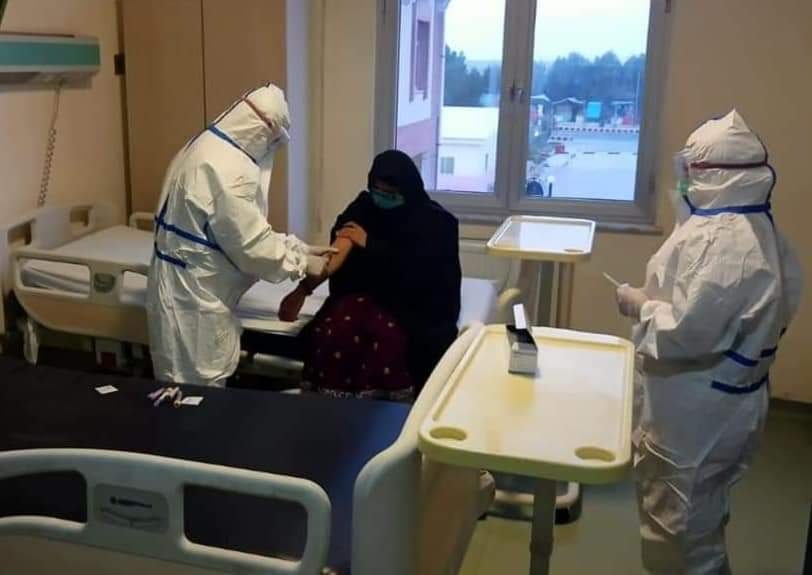‘N95 masks and personal protective equipment kits are not meant for general public’
Doctors in Pakistan are stressing that N95 masks and specialised personal protective equipment (PPE) kits are not meant for the general public and are only needed for healthcare providers dealing with infectious diseases, including Covid-19.
Infectious diseases experts Dr Azizullah Khan Dhiloo and Dr Shobha Luxmi stress that people must understand that they do not need N95 respirators (N95 masks) and PPEs. Both Dr Dhiloo and Dr Luxmi are directly dealing with Covid-19 patients in Karachi's Civil and Dow Ojha hospitals.
Who needs N95 respirators right now?
The N95 respirators offer protection against aerosol-generating procedure for direct healthcare workers and during handling of respirator samples by lab staff.
The US Centres for Disease Control recommends the use of NIOSH (US National Institute for Occupational Safety and Health) certified respirators equivalent to N95 or greater to prevent the inhalation of infectious particles (e.g. Mycobacterium tuberculosis, Avian influenza, Severe acute respiratory syndrome (SARS), pandemic influenza, and Ebola). The CDC does not currently recommend that the general public use facemasks.

“The general public definitely does not need to use the N95 masks for coronavirus,” also stresses Dr Summiya Nizamuddin, a consultant medical microbiologist at Shaukat Khanum and the general secretary of Medical Microbiology and Infectious Diseases Society Pakistan (MMIDSP).
"Also, people need to know that they cannot wear this (N95) mask for more than a week and it must be discarded once it’s distorted while surgical ones can be reused but must be thrown away if they get wet."
Who needs the PPE kit?
A PPE kit comprises of disposable masks, gowns, hoods, gloves and shoe covers, face shields, and protective goggles worn by healthcare providers dealing with infectious diseases. Not all these items are needed by everyone in a hospital setting, experts say.

The CDC says "patients with confirmed or possible SARS-CoV-2 infection should wear a facemask when being evaluated medically. Healthcare personnel should use eye protection (e.g., goggles or a face shield) when caring for patients with SARS-CoV-2 infection". These precautions include the use of PPE, including NIOSH-approved N95 respirators, gowns, gloves, face shield/eye protection, etc.
Gloves, gowns, goggles and face shields are needed when seeing suspected cases and carrying out nasopharyngeal sampling.
Gloves, medical masks and sanitisers

Experts say sanitisers, gloves and surgical masks are mandatory for those at the frontline. These include hospital receptionists, hospital guards, doctors and nurses.
Dr Nazimuddin says for doctors and nurses working in OPDs and other areas of hospitals, masks and sanitisers are must.
These items are also needed for hospital guards, attendants, receptionists, cleaners or simply put anyone at the gates — staff that is the most vulnerable and often the most overlooked.
Seeing Covid-19 patients
According to a guideline issued by the Pakistan Kidney and Liver Institute (PKLI), anyone entering the room of a Covid-19 patient must wear gloves, medical mask, a full sleeves gown and goggles to prevent risk of splash.
The guide adds that "routine use of masks by all is not deemed to be helpful and is not recommended".
The Hazmat suit
A Hazmat suit — comprising a medical gown, surgical gloves and boots — is needed for emergency medical services providers. Its splash guard (face shield) and goggles offer medical staff treating Covid-19 patients protection during nasopharyngeal procedure as well as from sneezes and cough.
Best bet for public
According to CDC guidelines, the general public does not need N95 and PPE kits at all. Rather, it stresses on washing one's hands, covering one's cough, and staying home when mildly unwell.
"It’s unfortunate that we have been unable to educate doctors, nurses and the masses about who gets to use PPEs and why basic hygiene — especially hand washing — and social distancing is way better than getting worried about masks," says Dr Shereen Khan, head of Tuberculosis Department at Fatimah Jinnah Hospital in Quetta, who is currently looking after Covid-19 cases in the province.
Washing hands with soap and water for 20 seconds is one small step that is much needed along with adequate social distancing, he stresses.





